Top 10 Most Popular Igbo Foods

The Igbos, one of Nigeria's three major ethnic groups, are renowned for their rich cultural heritage, including a diverse culinary tradition. In today's exploration, we delve into Igbo cuisine, characterized by staples such as legumes, vegetables, maize, cocoyam, cassava, and yam. These elements form the foundation of original traditional diets, giving rise to a plethora of distinctive dishes associated with Igbo culinary practices.
In the realm of Igbo cooking, women are revered as masters of the kitchen, weaving their expertise into dishes like Oha, Nni Oka, Nni Akpu, Nni Ji, Onugbu, Okazi, Achi, and many others. What makes these culinary delights even more fascinating is that they extend beyond the borders of Igbo culture, finding appreciation among various Nigerian tribes.
Soups hold a special place in Igbo cuisine, serving as the heart of many meals. Notable among them are Egwusi, Nsala, and Ofe Oha, each contributing its unique flavour profile to the gastronomic landscape. The Igbo people have a predilection for yam, consuming it in diverse forms, boiled or pounded; accompanied by an array of soups.
For those familiar with the Igbo ethnic group or those in relationships with Igbo individuals, a journey through their favourite foods unveils a culinary tapestry rich in flavour and cultural significance.
The 10 Most Popular Igbo Foods
- Oha Soup – African Rosewood plant
- Ofe Onugbu – Bitter Leaf Soup
- Nwobi – Cow feet
- Abacha – African salad
- Okpa – Bambara groundnut
- Agidi – Corn jellos
- Ji Mmiri oku – Yam Pepper Soup
- Ukwa – African Breadfruit
- Okra Soup
- Ji – Yam
1. Oha Soup
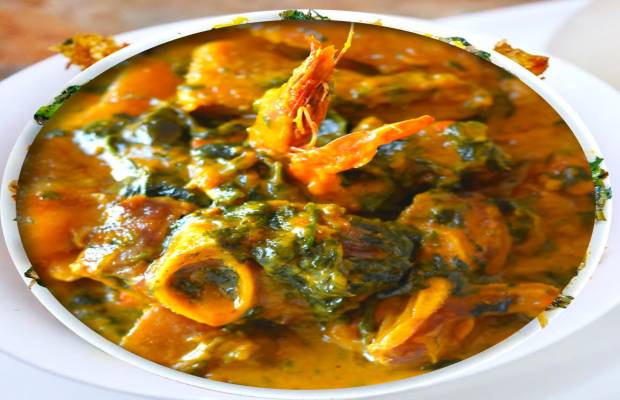
Hailing from Nigeria's eastern region, Oha Soup stands out as a delightful and traditional Igbo culinary masterpiece. Crafted from the leaves of the African Pterocarpus soyauxii/Pterocarpus mildbraedi tree, known as Oha leaves, this soup boasts a richness and healthiness that leaves an irresistible impression.
2. Ofe Onugbu (Bitter Leaf Soup)
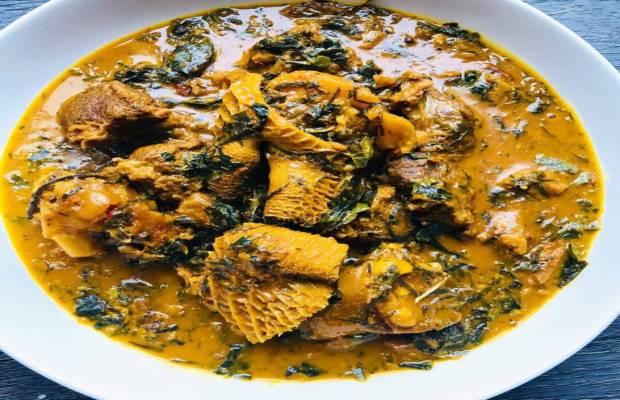
READ ALSO » Most Consumed Foods In China 2023: Top 8 Popular
Ofe Onugbu, commonly referred to as Bitter Leaf Soup presents a culinary symphony of rich flavours. Beyond its distinctive bitterness, this traditional Igbo dish incorporates an array of savoury meats, succulent fish, and the hearty addition of cocoyams, creating a complex and satisfying taste profile. When the craving for warmth strikes, this soup becomes a culinary haven. Prepare it with care, serve it alongside your favourite swallow, and indulge in the harmonious blend of textures and flavours that await your palate.
3. Nkwobi (Cow Feet)

Nkwobi, a tantalizing Nigerian delicacy, is a spicy dish crafted from cow feet. While it exudes an air of sophistication often associated with eat-out meals in Nigerian restaurants and beer parlours, its preparation is surprisingly simple, relying on readily available ingredients. This juxtaposition of apparent complexity and ease of cooking adds to the allure of Nkwobi, making it a delightful and accessible culinary experience for those seeking a taste of Nigerian gastronomy.
4. Abacha (African Salad)

Rooted in the culinary traditions of the Igbo tribe in Eastern Nigeria, Abacha and Ugba, commonly known as African salad, constitute a cassava-based delicacy. Abacha, derived from dried and shredded cassava, pairs harmoniously with Ugba, a fermented African oil bean seed, to create a unique gastronomic experience.
The origins of Abacha trace back to Enugu, where cassava plays a central role in its preparation. While this dish can be served as either an appetizer or a main course, its most common presentation is as a welcoming gesture to guests before the main meal. The versatility of Abacha is evident in the diverse preparation methods found across different towns and residences. In Enugu, no festivity is deemed complete without the inclusion of Abacha on the menu.
The true essence of Abacha is often heightened when savoured with fresh palm wine, elevating the dining experience and capturing the spirit of cultural celebrations in Eastern Nigeria.
5. Okpa (Bambara Groundnut)
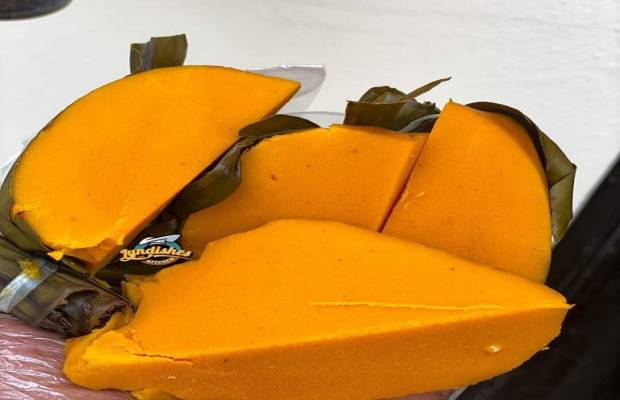
Okpa, often hailed as the king's feast or lion's food, stands as a traditional culinary gem originating from Enugu in Eastern Nigeria. Crafted from Bambara flour, derived from the Bambara nut, Okpa offers a straightforward yet delightful gastronomic experience.
The simplicity of Okpa's preparation is noteworthy, requiring only a handful of ingredients and a cooking time of 45 to 50 minutes. Typically encased in banana leaves or thin white nylon bags, Okpa is readily available throughout Enugu, making appearances in cafes and parks across the state.
READ ALSO » Top 10 Most Popularly Consumed Foods In Africa
Serving suggestions for Okpa abound, with popular pairings including Coke, Pap, soaked Garri, or tea. The versatility of Okpa not only lies in its accessibility but also in its ability to complement various beverages, enhancing the overall enjoyment of this cherished Eastern Nigerian dish.
6. Agidi (Corn Jellos)
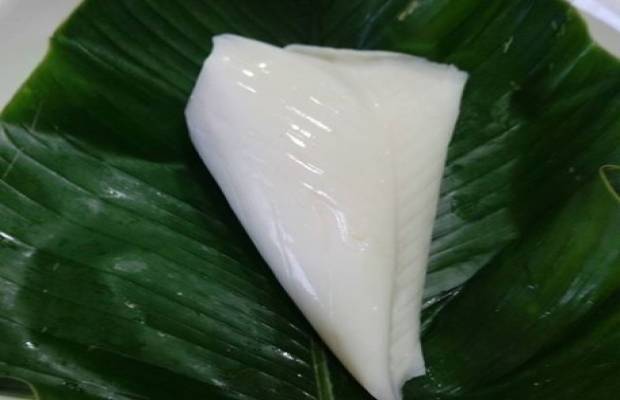
Nigerian Agidi, also known as Eko, bears a resemblance to Nigeria's version of Jello. Made from corn flour, the preparation process shares similarities with making Ogi, albeit with a slight variation. The delightful taste of Agidi or Eko comes to life, particularly when paired with hot Akara or Pepper Soup, creating a satisfying and harmonious culinary combination that captures the essence of Nigerian flavours.
7. Ji Mmiri Oku (Yam Pepper Soup)
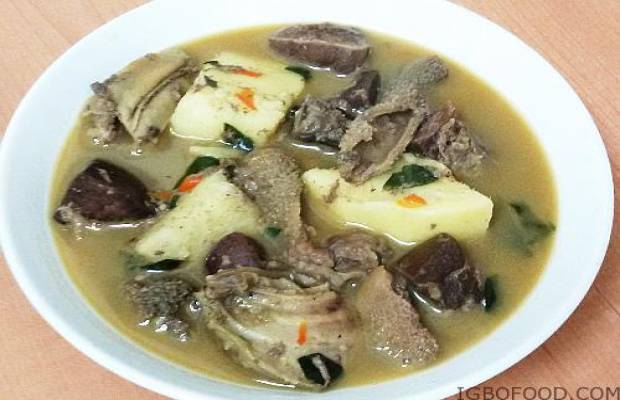
Ji Mmiri Oku, a Nigerian yam and dried fish pepper soup porridge, has its roots firmly planted in Igbo culinary heritage. This traditional dish holds a special place as a dinner option served to new mothers shortly after they have given birth, a practice traditionally known as the Omugwo time.
Characterized by the infusion of hot pepper, Ji Mmiri Oku is believed to contribute to the healing process for new mothers. This flavorful and comforting porridge not only reflects the cultural significance attached to postpartum nourishment but also embodies the warmth and care embedded in Igbo traditions surrounding family and culinary practices.
8. Ukwa (African Breadfruit)
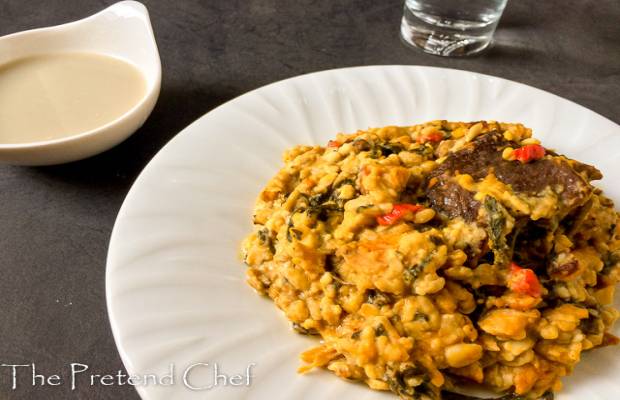
Ukwa, classified as a typical fruit, shares its botanical lineage with other exotic fruits like breadnuts, jackfruit, figs, and mulberries, as it belongs to the Moraceae family. Particularly popular in Nigeria, Ukwa takes centre stage as a main course dish. Its inclusion in Nigerian cuisine underscores its significance, offering not only a unique flavour but also a connection to the diverse and rich culinary tapestry of the region.
9. Okra Soup

Okra soup, a luscious Nigerian delicacy, boasts a thick consistency derived from a combination of okra, meat or fish, palm oil, smoked catfish, and traditional Nigerian spices. Recognized for its simplicity and affordability.
The culinary appeal of this soup is heightened when crafted with fresh fish, imparting a delightful freshness to the overall flavour profile. Okra soup, with its humble yet flavorful ingredients, stands as a testament to the accessible and delicious nature of Nigerian cuisine.
10. Ji (Yam)
A staple in Igbo cuisine, yam takes various forms, with preferred methods including Ji Ahrur Ahu, Ji Olulu/Orulu Ji Abubo, and Ji Mmanu, each showcasing the versatility of this essential ingredient. The preparation process, known as Igwo Ji or Ibio Ji, adds another layer of cultural significance to the consumption of yam.
READ ALSO » Top 8 Most Consumed Foods In Canada 2023
In conclusion, the diversity and flavour of Igbo cuisine paint a vivid picture of cultural richness and culinary excellence. From the delectable Oha Soup, rooted in the eastern region's traditions, to the spicy allure of Nkwobi crafted from cow feet, each dish reflects a unique blend of ingredients and techniques. Abacha and Ugba, Okpa, Agidi, Ji Mmiri Oku, Ukwa, Okra Soup, and the quintessential Ji (Yam) showcase the depth of Igbo gastronomy. This culinary journey through Eastern Nigeria unveils not just meals but stories, traditions, and a profound connection to the cultural heritage embedded in every flavorful bite.
